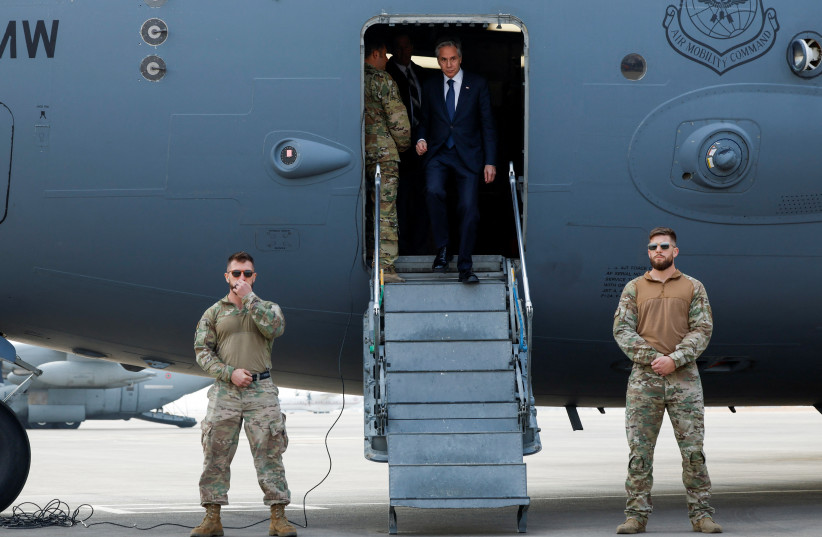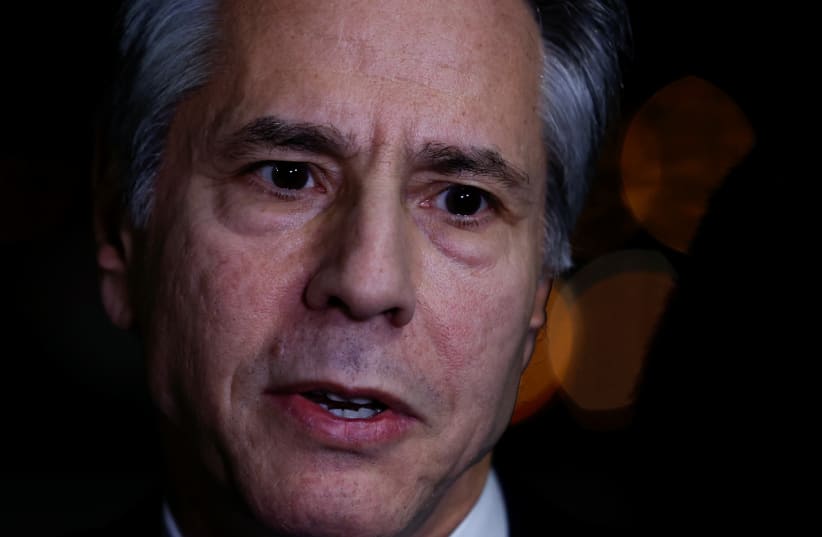“We’re not going to get into the business… of rebuilding Gaza, only to have it leveled again in a year or five years,” Antony Blinken reported Arab leaders as saying.
TOVAH LAZAROFF JANUARY 16, 2024 22:37
Palestinian statehood is the best path to the reconstruction of Gaza and normalized Israeli ties with its Arab neighbors, including Saudi Arabia, US Secretary of State Antony Blinken told CNBC on Monday.
He said Arab countries are saying, “Look, we’re not going to get into the business, for example, of rebuilding Gaza, only to have it leveled again in a year or five years and then be asked to rebuild it again,” as he spoke to the network on the sidelines of the World Economic Forum in Davos, that drew top policymakers from around the globe, including the Middle East.
The Israel-Hamas war in Gaza, a two-state resolution to the conflict, and the potential revival of a deal between Riyadh and Jerusalem are expected to be among the key discussion points.
As Israel shifts to a lower-intensity assault phase and displaced civilians have begun to return to northern Gaza, world leaders have begun to tackle the issue of Gaza reconstruction.
Qatari Prime Minister Mohammed Bin Abdulrahman al-Thani addressed the Davos forum with sentiments similar to Blinken’s, stating that Arab countries won’t inject funds into rebuilding Gaza “unless we address the real issue, which is the two-state solution” to the conflict, he said.

U.S. Secretary of State Antony Blinken exits a plane as he arrives in Cairo, during his week-long trip aimed at calming tensions across the Middle East, in Egypt, January 11, 2024. (credit: REUTERS/EVELYN HOCKSTEIN/POOL)
“Right now, unfortunately, there are some politicians who thought this matter can be just put under the rug and people will forget about it,” Thani said.
The war in Gaza, which began on October 7, has shown that this is not possible, he said. The only active talks now, Thani said, are for the release of Israeli hostages in Gaza in exchange for a ceasefire, but one also has to focus on the larger peace process.
“We need to address the two-state solution”
“We need to address the two-state solution,” Thani said. He cautioned that any two-state process must be “time-bound” and “irreversible” so that future governments in Israel can’t rescind decisions made for a final-status agreement.
“We cannot be hostage to [Israeli] elections,” Thani said.
Blinken said that Israel has a “fundamental” choice to make about its future once the Gaza war is over.
He described how the Hamas-led attack against Southern Israel in which over 1,200 people were killed and some 250 hostages seized that sparked the Gaza war could be transformed from a disaster to an impetus to reshape the region.
The US had been pushing for a normalization deal between Israel and Saudi Arabia before October 7 and at Davos, and leaders including Blinken said that the deal was still possible.
“You’re in a place right now where, again, Arab countries, including countries like Saudi Arabia, are prepared to do things in their relationship with Israel they were never prepared to do before. That opens up an entirely different future. A much more secure future,” Blinken said.
The region is prepared to give Israel “the kind of security assurances and commitments and guarantees that they never would have given in the past,” he said.
That can only happen if the Palestinians receive statehood, Blinken stressed.
“Until that question is resolved, you’re never really going to have peace and stability. And, for that matter, Israel is never going to know true security.
“So, when you, when you put together integration in the region, Israel’s normalization of relations with, with every country, security assurances and commitments, a Palestinian state. You’ve created an entirely new region. And then Israel’s biggest challenge, the biggest problem, for us as well, Iran, is isolated. It answers that problem very powerfully as well,” he said.
Norway’s foreign minister, Barth Eide, said at Davos that several European states, “concerned” Arab countries, and the United States are working on a concept for a unified Palestinian government that could attract reconstruction funds, Norway’s foreign minister said in an interview in Davos.
“Several countries are working with us… trying to build a broad unity government,” he said, without naming the specific countries.
Norway is of the view that a unified Palestinian territory should be run by the Palestinian Authority, but “prefacing everything, it has to be what the Palestinians want,” he added.
Norway served as a facilitator in the 1992-1993 talks between Israel and the Palestine Liberation Organization (PLO) that led to the Oslo Accords in 1993.
Since the Oslo talks, Norway has chaired a donor group coordinating international assistance to the Palestinian territories, the Ad Hoc Liaison Committee (AHLC), and worked with others to try to revive a diplomatic channel between Israel and the Palestinians.
Eide said work on a two-state solution was becoming urgent as the conflict was spreading in the region, but that only the United States and the Israeli people could influence Israel’s position.
“What we can do is work on Palestinian unity and think about models with interested countries,” he said.
“The long-term stability of Israel and peace and prosperity for Palestinians does require a two-state solution,” Eide said.
Saudi Arabian Foreign Minister Foreign Minister Faisal bin Farhan said, “We agree that regional peace includes peace for Israel, but that can only happen through peace for Palestinians through a Palestinian state,”
“This is something that we have been working on with the US administration,” Farhan said, saying that Israel’s failure to halt the Gaza war “is putting the prospect for regional peace at risk.”
Farhan pointed to the high cost of the war for Palestinians. Hamas has asserted that close to 24,000 Palestinians have been killed in war-related violence. Israel has said that some 9,000 of those fatalities are combatants .
He clarified that both Israel and Hamas must commit to a ceasefire.
There is a pathway toward a much better future for the region, that is peace, and we are fully committed to that,” Farhan said, adding that within that wider regional context, his country would recognize Israel.
Reuters contributed to this report.
Content retrieved from: https://www.jpost.com/international/article-782467.
